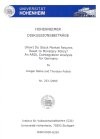
(How) Do Stock Market Returns React to Monetary Policy?
An ARDL Cointegration Analysis for Germany
Beitrag, Englisch, Universität Hohenheim
Autor: Prof. Dr. Ansgar Belke
Herausgeber / Co-Autor: Thorsten Polleit
Erscheinungsdatum: 2005
Quelle: Diskussionsbeiträge aus dem Institut für Volkswirtschaftslehre der Universität Hohenheim 253/2005
Aufrufe gesamt: 3898, letzte 30 Tage: 1
Kontakt
Verlag
Universität Hohenheim Fakultät Wirtschafts- und Sozialwissenschaften Fachgebiet Außenwirtschaft
Telefon: +49-711-459-3246
Telefax: +49-711-459-3815
Preis: Kostenlos
Is a central bank able to influence stock market returns? In order to answer this question, we test for cointegration between stock market returns and central bank interest rates in Germany for the period 1974 – 2003. Problems related to spurious regression could arise from the mixed order of integration of the series used, from reverse causation between the variables and from the lack of a long run relationship among the variables of the model. We address these problems by applying the bounds testing approach and autoregressive distributed lag models developed by Pesaran and others. The empirical results are also compared with those obtained from a more standard econometric approach, the Johansen procedure. Seen on the whole, we cannot empirically reject the view that the Bundesbank – and then the ECB – have had a significant short- and long-run impact on stock market returns. We conclude that short-term rates drive stock market returns but not vice versa. But the results are confined to a single stock market return measure, namely dividend growth.
Fachthemen
DE, Essen
Inhaber des Jean-Monnet Lehrstuhls VWL, insbes. Makroökonomik an der Universität Duisburg-Essen
ECB-Observer
Publikationen: 133
Veranstaltungen: 4
Aufrufe seit 04/2005: 12525
Aufrufe letzte 30 Tage: 24



